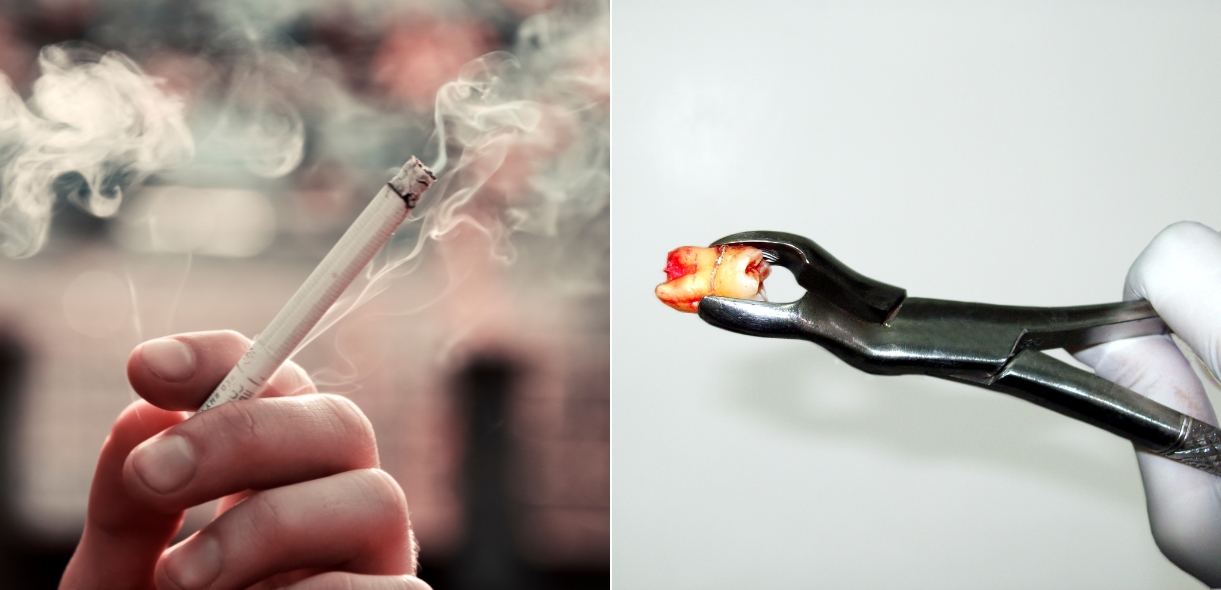$99 New Patient Special - Includes Exam and X-Rays.
Smoking After a Tooth Extraction: Fact or Fiction?

By Dentist At Plum Creek Kyle
For smokers facing a tooth extraction, the question looms large: can that post-operative cigarette still happen? Unfortunately, the answer isn’t as simple as a puff of smoke. While the lure of a familiar habit might be strong, dabbling in tobacco after tooth extraction comes with hidden dangers that can derail your healing journey and leave you in far more discomfort than a nicotine craving. In this article, we’ll delve into the truth behind smoking after tooth extraction, exploring the potential complications, busting common myths, and offering tips for navigating this crucial recovery period. Buckle up, smokers, because the road to a healthy mouth might require a detour from your usual pack.
Smoking After a Tooth Extraction: The First 24 Hours
The initial 24 hours after a tooth extraction are crucial for forming a stable blood clot in the empty socket. This clot acts as a protective barrier, promoting healing and preventing infection. Smoking disrupts this delicate process in several ways:
- The act of inhaling: The sucking action can dislodge the forming clot, exposing the bone and nerve endings beneath. This can lead to excruciating pain and a condition known as dry socket.
- Chemicals in cigarettes: Tobacco contains numerous harmful chemicals that constrict blood vessels and impede blood flow. This reduces oxygen and nutrients reaching the extraction site, slowing down healing and increasing the risk of infection.
- Increased inflammation: Smoking triggers an inflammatory response in the body, further compromising the healing process and potentially causing swelling and discomfort.
Therefore, avoiding smoking altogether for the first 24 hours is strongly recommended. This gives your body the best chance to form a stable clot and initiate healing.
Smoking Dry Socket Myth: Fact or Fiction?
A common misconception among smokers is that smoking only causes dry socket. While dry socket is indeed a significant risk associated with smoking after extraction, it is not the only complication. Smoking can also lead to:
- Increased pain and discomfort: The disrupted healing process and exposed nerves can lead to intense pain around the extraction site.
- Delayed healing: Reduced blood flow and impaired tissue regeneration slow down the healing process, prolonging discomfort and increasing the risk of infection.
- Increased risk of infection: The exposed bone and compromised immune system due to smoking make the extraction site more susceptible to bacterial infection.
- Impaired bone regeneration: The chemicals in tobacco can interfere with bone growth, potentially affecting implant placement in the future.
Therefore, the notion that smoking only causes dry sockets is a dangerous myth. The consequences of smoking after extraction extend far beyond just this painful condition.
How to Prevent Dry Socket While Smoking (if you must)
If quitting smoking for 24-72 hours after extraction is absolutely not an option, there are a few precautions you can take to minimize the risks:
- Wait at least 24 hours: While ideal to abstain completely, waiting 24 hours allows the initial clot to form, reducing the risk of dislodgement.
- Take small, shallow puffs: Avoid deep inhalations that create strong suction and can dislodge the clot.
- Use gauze pads: Place moistened gauze pads over the extraction site to act as a physical barrier against the suction from smoking.
- Maintain excellent oral hygiene: Brush gently around the extraction site and rinse with salt water solution to keep the area clean and prevent infection.
- Limit smoking frequency: Smoke as little as possible and avoid chain-smoking.
- Drink plenty of fluids: Stay hydrated to promote blood flow and healing.
- Avoid hot beverages and alcohol: These can irritate the extraction site and delay healing.
Remember, these are merely harm reduction strategies and cannot erase the inherent risks of smoking after extraction.
Conclusion: Prioritize Healing Over Habit
Following a tooth extraction, the temptation to light up a cigarette might be strong, but remember, smoking after tooth extraction is a gamble with your recovery. The risks of pain, delayed healing, and complications like dry socket far outweigh any fleeting satisfaction.
Choosing to prioritize healing over habit for just a few days will pay off in a quicker, smoother recovery and a healthier mouth in the long run. Discuss smoking cessation options with your dentist and consider this an opportunity to kick the habit for good. Your body and your smile will thank you.
Remember, quitting smoking is never easy, but with the right support and resources, you can achieve it. Make your health a priority, and ditch the cigarettes after your tooth extraction. It’s the best decision you can make for a pain-free recovery and a healthier future.




